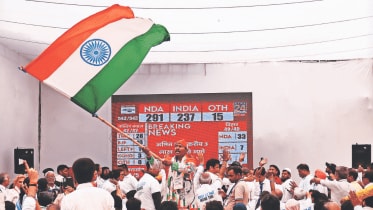By Amitabh Ranjan
Vaclav Havel, the last president of Czechoslovakia and the first of the Czech Republic, was a playwright, poet and political dissident rolled into one. In one of his best known works, Disturbing the Peace, he writes: “Hope is definitely not the same thing as optimism. It is not the conviction that something will turn out well, but the certainty that something makes sense, regardless of how it turns out”. Few could offer such a wholesome perspective on ‘hope’ than one of the leading figures of the Prague Spring.
It is hope and its protean forms, which stand up to an autocratic regime denying women and men universal rights, that shape the subject matter of Indrajit Roy’s Audacious Hope: An Archive of How Democracy is Being Saved in India.
Starting with a historical perspective of how authoritarianism across geographies has been resisted by people, the author says it is not always established by the march of the jackboot. Modern world history is replete with instances when elected representatives have used internal disturbances, social unrest, economic crisis and political uncertainty as excuses to suspend the democratic rights of the same people who send them to seats of power. If it was the Reichstag’s Enabling Act that saw Adolf Hitler annihilate all checks on his rule, it was a series of legislative manipulations by the Herenigde Nasionale Party that brought in the infamous Apartheid in South Africa. If the last decade of the 19th century saw a large number of black people being disenfranchised in the USA by what came to be known as Jim Crow laws, almost a 100 years later Myanmar’s Citizenship Act of 1982 stripped the country’s Rohingya minority of their status as citizens. Closer home, Indira Gandhi’s Emergency and its excesses remain the most enduring symbol of the usurpation of rights by an elected government.
Roy says besides ruthless repression, divisive machinations and autocratic practices, there is something else which is common in such moments. It is the spirit of stubborn hopefulness when the very people seen as weak and pliable by the regime decide to confront, subvert and undermine democratic decline.
It is in this backdrop that the author’s India story of the past one decade begins that is marked by the transitioning away from democracy since the electoral rise of the BJP under Narendra Modi and his man Friday Amit Shah. When it came to power in 2014, the new government appeared to be a panacea of all ills the country was suffering from—a slow rate of growth, fewer jobs coming by, a government mired in corruption, a paralysed decision-making and an ageing prime minister who had lost control over his colleagues. Modi was hailed as “an embodiment of desire for change”.
But soon the things would change for the worse. Starting with the ne plus ultra of administrative misadventure, demonetisation, one misstep after another would follow—the Citizenship Amendment Act, a stringent lockdown at short notice, three agriculture laws that brought farmers on the streets, etc.
There has been something more sinister about this regime. The ideological subversion of the Indian ethos that the regime has deliberately targeted has threatened to tear asunder the social fabric. Riding on muscular nationalism mixed with Hindutva, it has sought to alienate Muslims by creating a narrative of ‘us’ versus ‘them’. For the marginalised within the Hindu fold, the Hindutva proponents have neglected the realities of caste-based discrimination and have thus created a template of deflecting demands for caste equality.
A professor of Global Development Politics at the University of York, Roy, who specialises in the study of Indian politics in comparative and historical perspectives, narrates tales of how amid all these the people of India have fought and hoped for a better future. The civil society lending a hand during the pandemic and lockdown, the Shaheen Bagh Dadis who became the face of CAA protests, the farmers who weathered the chill and an apathetic government, the students who fought on campuses and on streets for their freedom of speech and the assertion of the subaltern to have their place in the sun come out in vivid details with a rare scholarship and clarity.
A chapter devoted to how the country’s contemporary artistes—poets, stand-up comedians, singers—have stood up to the powers that be, often in the face of hardships and sanctions, is a treat for the reader. A unique feature of this chapter is the placement of QR codes with text to access audio-visual content.
What the author says will resonate with the outcome of the 2024 election. The people have spoken in no uncertain terms. They will wield the power of vote to rein in a government seen as autocratic. Writing in ThePrint on the counting day, veteran journalist Shekhar Gupta said in his trademark style: “All those who said India’s democracy was dead and buried, that we were no-hopers under fascist-rule, please sit down and drink Kool-Aid. You can gulp a beta blocker with it if you think you need it. But consult your doctor first.” The last two sentences added for a humorous punch show how hope is not only audacious but infectious too. And that’s why the reader will find it difficult to put down the book before she is done with it.
The author is a former journalist who teaches at Patna Women’s College.
Book- Audacious Hope: An Archive of How Democracy is Being Saved in India
Indrajit Roy
Westland Books
Pp 256, Rs 599
Disclaimer: Views expressed are personal and do not reflect the official position or policy of Financial Express Online. Reproducing this content without permission is prohibited.
